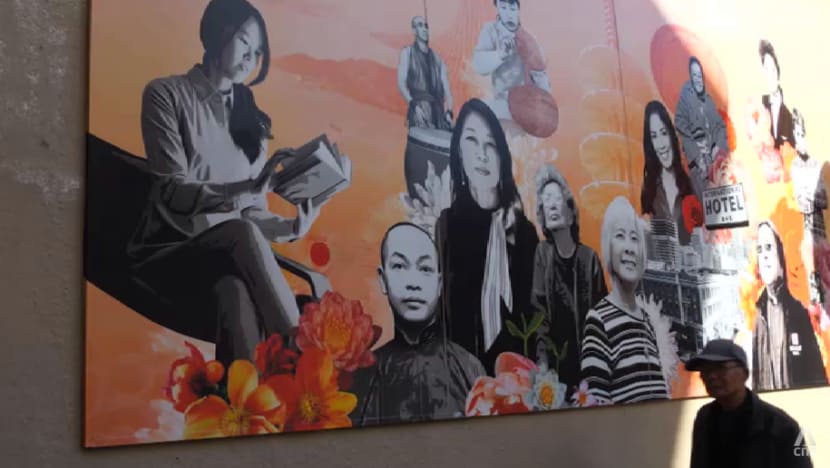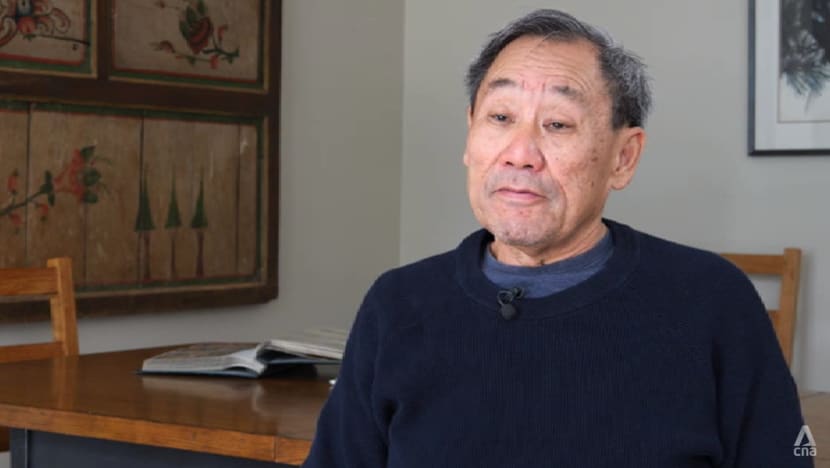US birthright citizenship has roots in the historical case of a Chinatown cook
More than 120 years ago, a Supreme Court decision in favour of a Chinese-American man named Wong Kim Ark played a key role in affirming birthright citizenship.

A mural featuring immigrants to the US, including Wong Kim Ark (bottom left), in the Chinatown district of San Francisco.

This audio is generated by an AI tool.
WASHINGTON: One of United States President Donald Trump’s most controversial executive orders since taking office is his attempt to ban birthright citizenship.
The legal principle, a cornerstone of US immigration law, provides that anyone born on US soil is considered a citizen.
It derives from the Citizenship Clause of the 14th Amendment that was added to the Constitution in 1868.
It states: “All persons born or naturalised in the United States and subject to the jurisdiction thereof, are citizens of the United States and of the State wherein they reside.”
The amendment has its roots in the Civil Rights Act, and is intended to ensure that millions of formerly enslaved people became Americans following the civil war.
The principle was upheld by the 1898 Supreme Court case United States vs Wong Kim Ark, which affirmed that children born in the US are citizens, regardless of their parents' immigration status.
WONG’S LEGACY
Wong was born in 1873 in San Francisco to merchant parents who emigrated to the US from China’s Guangdong province.
He worked as a cook in the city’s Chinatown, home to a small, thriving community of Chinese immigrants who flocked to California amid the gold rush.
In 1895, Wong was detained after returning from a trip to China by customs officials who argued he was not an American citizen due to his parents’ Chinese nationality.
Anti-Chinese policies were on the rise at the time, notably the Chinese Exclusion Act that sought to stop immigration from China completely.
In a landmark ruling, the Supreme Court declared Wong to be a citizen because he was born in the US.
REACTION TO TRUMP’S ORDER
Wong’s case changed the life trajectory of millions of Chinese and other immigrants to the country.
But now, his legacy is being tested. Trump signed the executive order seeking to end birthright citizenship when he took office two weeks ago, sparking renewed fears in immigrant communities.
Wong’s descendant, Norman Wong, who still lives near San Francisco, is among Americans concerned about what will happen if those rights are taken away.

He told CNA the fight took a toll on his great-grandfather.
“Only a few were willing to stand up because, you know, you become a focal point,” he said.
“That, probably, was on him for the rest of his life. As long as he was in the United States, he had to watch his step.”
Advocates called Trump’s order unconstitutional, vowing to continue the fight to preserve American core values.
“Regardless of how we came (to the US), children born here are citizens. And that has transformed the way our cities and our states, our country looks,” said Annie Lee, managing director of civil rights organisation Chinese for Affirmative Action.
JUDGE BLOCKS ORDER
States and cities, including San Francisco, have sued the Trump administration over his order.
On Wednesday (Feb 5), a second federal judge issued a nationwide preliminary injunction that indefinitely blocked Trump's bid.
District Judge Deborah Boardman of Maryland sided with those opposing the directive, joining another judge in Seattle who earlier paused the policy from taking effect for 14 days.
She called it “blatantly unconstitutional”, adding that no court in the country has endorsed Trump's interpretation of the charter.
“The executive order conflicts with the plain language of the 14th Amendment, contradicts 125-year-old binding Supreme Court precedent and runs counter to our nation’s 250-year history of citizenship by birth,” Boardman ruled.
The ruling extends the pause on the order until a higher court overturns it, a successful appeal by Trump’s administration, or the legal process plays out, which could take months or even years.
The hearing is one of at least eight lawsuits filed by Democratic attorney generals and immigrant rights groups across the US.
If Trump's order is allowed to stand, analysts estimate that more than 150,000 newborn children could be denied citizenship – a cornerstone for many other rights, including the ability to vote.
















